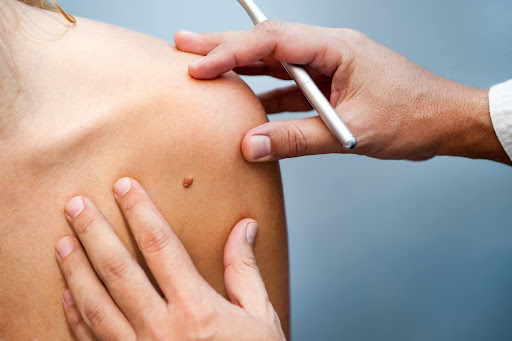When we think about our health, we tend to favor the most vital organs. We think about our hearts. We think about our lungs. But too often, we forget the body’s largest and most visible organ–our skin.
Unfortunately, this oversight can have disastrous consequences. In the United States alone, upwards of 100,000 new cases of melanoma are diagnosed per year. An additional five million cases of carcinoma also occur. Thankfully, you’re far from powerless in the fight against skin cancer. In fact, you’re the best first line of defense.
If you have a suspicious mole, bump, or discoloration, use the ABCDEs of skin cancer to determine your risk. When in doubt, schedule a skin cancer screening in Chicago, IL.
Assessing The Risk of Suspicious Moles in Chicago, IL
At Skin MD, we treat skin cancer in numerous ways. We may suggest a surgical excision of the cancerous mole, a course of immunotherapy, or a gold-standard Mohs surgery. But even the best skin cancer treatments can’t replace vigilance at home.
To determine if a suspicious mole might be dangerous, use the ABCDE method.

The ABCDEs of Melanoma
When caught early, most forms of skin cancer have an excellent 5-year survival rate. And modern surgeries preserve as much healthy tissue as possible to accelerate the healing process. Keep an eye out for these signs; they can all alert you that it’s time to schedule an appointment with your trusted dermatologist.
A for Asymmetry
Benign moles, discolorations, and other lesions are generally round in shape and symmetrical. A spot or a dot may be completely harmless. But if you notice an asymmetrical spot, it’s a good idea to get it checked out.
B for Border
Harmless moles and spots usually present with a well-defined border. The edges of a benign lesion are clearly visible and the division between healthy and discolored skin is obvious.
But some cancerous and precancerous moles may have fuzzy borders. They may appear to spread or spill out from poorly defined edges.
C for Color
Our skin, hair, and eyes get their color from a naturally occurring pigment called melanin. Sun exposure and age can cause skin cells to discolor. These discolorations are usually harmless, and in the case of freckles, can even be preferable. But not all discolorations are innocent.
Benign spots usually have a single, consistent color. Dangerous lesions, on the other hand, may change color frequently. If you notice a spot that changes color often (not when it’s touched or when you’ve been out in the sun), you should have it examined.
D for Diameter
Benign lesions are generally tiny. Most of them are about the size of a #2 pencil eraser (about 2 mm) or smaller. Melanoma, meanwhile, can grow as large as 6 mm.
If you have a suspicious spot that’s larger than a pencil eraser, it’s wise to get it checked.
E for Evolution
Benign lesions can have nearly too many causes to count. Sunburns and other forms of even minor skin damage frequently cause discolorations. In most cases, these harmless moles and spots may stick around as-is for years. They generally won’t change characteristics – especially those listed above.
Cancerous spots, however, may evolve over time. They may grow or shrink in shape, change color, or even spread or contract at their borders. If the characteristics evolve this way, it’s time to schedule a skin cancer screening in Chicago, IL.
When In Doubt, Let Us Check it Out
With several locations throughout Chicago and some of the most accomplished dermatologists in The Windy City, Skin MD is your #1 source for all things skincare and self-care. Skin cancer can be frightening, but there’s good news – when detected early, melanoma, squamous cell carcinoma, and basal cell carcinoma can be treated.
Don’t put off your annual skin check, especially this close to summertime. Schedule your skin cancer screening today and know that you’re ready for all that sunshine. Call us today at (708) 636-3767 or contact us online.



